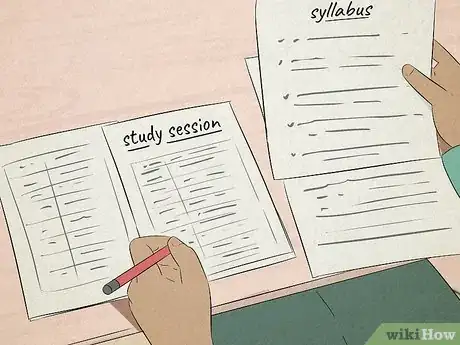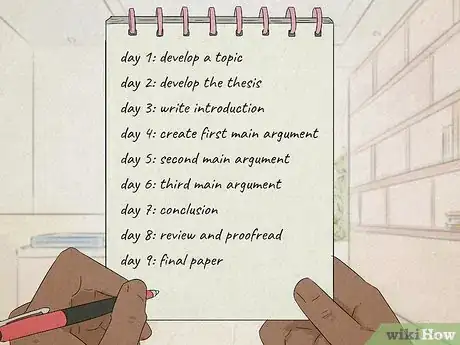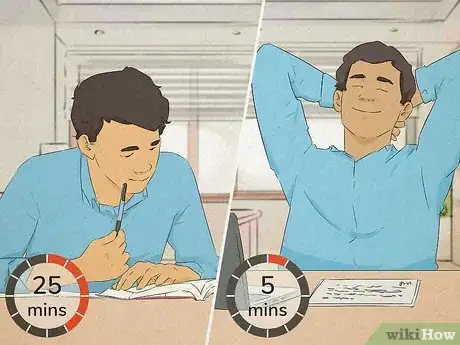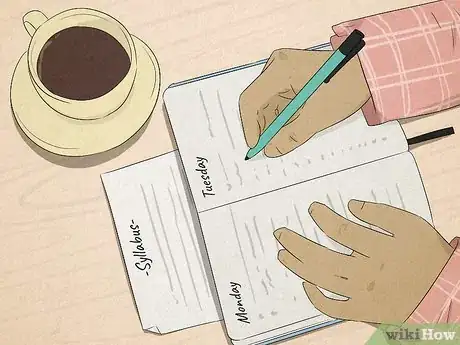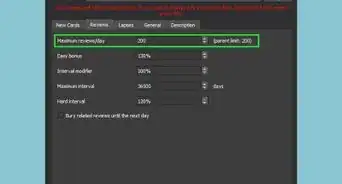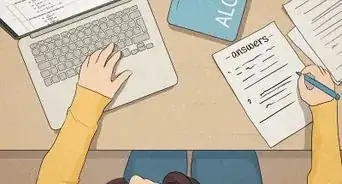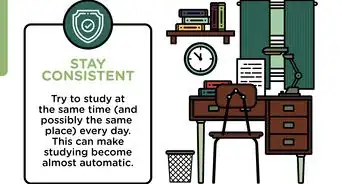This article was co-authored by Alexander Ruiz, M.Ed. and by wikiHow staff writer, Jennifer Mueller, JD. Alexander Ruiz is an Educational Consultant and the Educational Director of Link Educational Institute, a tutoring business based in Claremont, California that provides customizable educational plans, subject and test prep tutoring, and college application consulting. With over a decade and a half of experience in the education industry, Alexander coaches students to increase their self-awareness and emotional intelligence while achieving skills and the goal of achieving skills and higher education. He holds a BA in Psychology from Florida International University and an MA in Education from Georgia Southern University.
There are 7 references cited in this article, which can be found at the bottom of the page.
wikiHow marks an article as reader-approved once it receives enough positive feedback. In this case, 94% of readers who voted found the article helpful, earning it our reader-approved status.
This article has been viewed 158,184 times.
Whether you're a university student or simply learning something new on your own, study time is crucial if you want to do well in your classes. With a study plan, the time you need simply becomes a part of your day so you don't have to worry about an exam or deadline sneaking up on you. The process can seem daunting if you haven't made your own study plan before, but never fear! We've compiled all the most useful tips for you to get the most out of your study time. We'll start with advice on how to work studying into your schedule, then give you some bonus tips on how to structure each study session to max out your productivity.
Steps
Expert Q&A
Did you know you can get premium answers for this article?
Unlock premium answers by supporting wikiHow
-
QuestionHow can I stay motivated to study?
 Alexander Ruiz, M.Ed.Alexander Ruiz is an Educational Consultant and the Educational Director of Link Educational Institute, a tutoring business based in Claremont, California that provides customizable educational plans, subject and test prep tutoring, and college application consulting. With over a decade and a half of experience in the education industry, Alexander coaches students to increase their self-awareness and emotional intelligence while achieving skills and the goal of achieving skills and higher education. He holds a BA in Psychology from Florida International University and an MA in Education from Georgia Southern University.
Alexander Ruiz, M.Ed.Alexander Ruiz is an Educational Consultant and the Educational Director of Link Educational Institute, a tutoring business based in Claremont, California that provides customizable educational plans, subject and test prep tutoring, and college application consulting. With over a decade and a half of experience in the education industry, Alexander coaches students to increase their self-awareness and emotional intelligence while achieving skills and the goal of achieving skills and higher education. He holds a BA in Psychology from Florida International University and an MA in Education from Georgia Southern University.
Educational Consultant If you give yourself a reward after completing an assignment or at the end of all of your work, it will act as a behavioral mechanism to stay motivated. However, don't cheat and give yourself the reward when you’ve done nothing! Alternatively, I find when students have a good friend they can study with, this can also help them stay motivated. Again, you need to stay honest. It's okay to get off task at times, but give yourselves a goal to achieve by the end of your study session.
If you give yourself a reward after completing an assignment or at the end of all of your work, it will act as a behavioral mechanism to stay motivated. However, don't cheat and give yourself the reward when you’ve done nothing! Alternatively, I find when students have a good friend they can study with, this can also help them stay motivated. Again, you need to stay honest. It's okay to get off task at times, but give yourselves a goal to achieve by the end of your study session. -
QuestionHow can you study if you need an electronic device to study but are worried about being distracted by YouTube or games?
 wikiHow Staff EditorThis answer was written by one of our trained team of researchers who validated it for accuracy and comprehensiveness.
wikiHow Staff EditorThis answer was written by one of our trained team of researchers who validated it for accuracy and comprehensiveness.
Staff Answer wikiHow Staff EditorStaff AnswerLog out of any of the things you think might be a distraction and they'll be less tempting for you. If there's an icon on the screen with notifications or you have a program running in the background while you're studying, you'll be more likely to look at it when you should be studying. Study in short, 25-minute bursts, then take a 5-minute break. During your break, you can look at YouTube or play a quick game if you want.
wikiHow Staff EditorStaff AnswerLog out of any of the things you think might be a distraction and they'll be less tempting for you. If there's an icon on the screen with notifications or you have a program running in the background while you're studying, you'll be more likely to look at it when you should be studying. Study in short, 25-minute bursts, then take a 5-minute break. During your break, you can look at YouTube or play a quick game if you want. -
QuestionHow can I avoid procrastination?
 wikiHow Staff EditorThis answer was written by one of our trained team of researchers who validated it for accuracy and comprehensiveness.
wikiHow Staff EditorThis answer was written by one of our trained team of researchers who validated it for accuracy and comprehensiveness.
Staff Answer wikiHow Staff EditorStaff AnswerBreak larger, more intimidating projects into smaller chunks that you can do in short blocks of time. Then, schedule those short blocks throughout the week. Even if you find you can only focus on the project for 10 minutes at a time, if you schedule 2 10-minute blocks of work every day for a week, that's a total of more than 2 hours that you've worked on the project. If you're working for more than 20 minutes at a time, take a 5-10 minute break to refresh your mind so you'll focus better.
wikiHow Staff EditorStaff AnswerBreak larger, more intimidating projects into smaller chunks that you can do in short blocks of time. Then, schedule those short blocks throughout the week. Even if you find you can only focus on the project for 10 minutes at a time, if you schedule 2 10-minute blocks of work every day for a week, that's a total of more than 2 hours that you've worked on the project. If you're working for more than 20 minutes at a time, take a 5-10 minute break to refresh your mind so you'll focus better.
References
- ↑ https://www.intelligent.com/create-a-study-plan/
- ↑ https://firstyear.mit.edu/tutoring-support/study-tips/mastering-tests/draft-study-plan
- ↑ https://www.stetson.edu/administration/academic-success/media/STUDY%20SCHEDULE.pdf
- ↑ https://www.stetson.edu/administration/academic-success/media/STUDY%20SCHEDULE.pdf
- ↑ https://firstyear.mit.edu/tutoring-support/study-tips/mastering-tests/draft-study-plan
- ↑ https://firstyear.mit.edu/tutoring-support/study-tips/mastering-tests/draft-study-plan
- ↑ https://students.usask.ca/articles/study-skills.php
- ↑ http://lsc.cornell.edu/how-to-study/studying-for-and-taking-exams/guidelines-for-creating-a-study-schedule/
- ↑ http://lsc.cornell.edu/how-to-study/studying-for-and-taking-exams/guidelines-for-creating-a-study-schedule/
- ↑ http://lsc.cornell.edu/how-to-study/studying-for-and-taking-exams/guidelines-for-creating-a-study-schedule/
- ↑ https://firstyear.mit.edu/tutoring-support/study-tips/mastering-tests/draft-study-plan
- ↑ https://www.intelligent.com/create-a-study-plan/
- ↑ https://firstyear.mit.edu/tutoring-support/study-tips/mastering-tests/draft-study-plan
- ↑ https://students.usask.ca/articles/study-skills.php
- ↑ https://libguides.tees.ac.uk/ld.php?content_id=32011137
- ↑ Alexander Ruiz, M.Ed.. Educational Consultant. Expert Interview. 18 June 2020.
- ↑ Alexander Ruiz, M.Ed.. Educational Consultant. Expert Interview. 18 June 2020.
- ↑ http://lsc.cornell.edu/how-to-study/studying-for-and-taking-exams/guidelines-for-creating-a-study-schedule/




